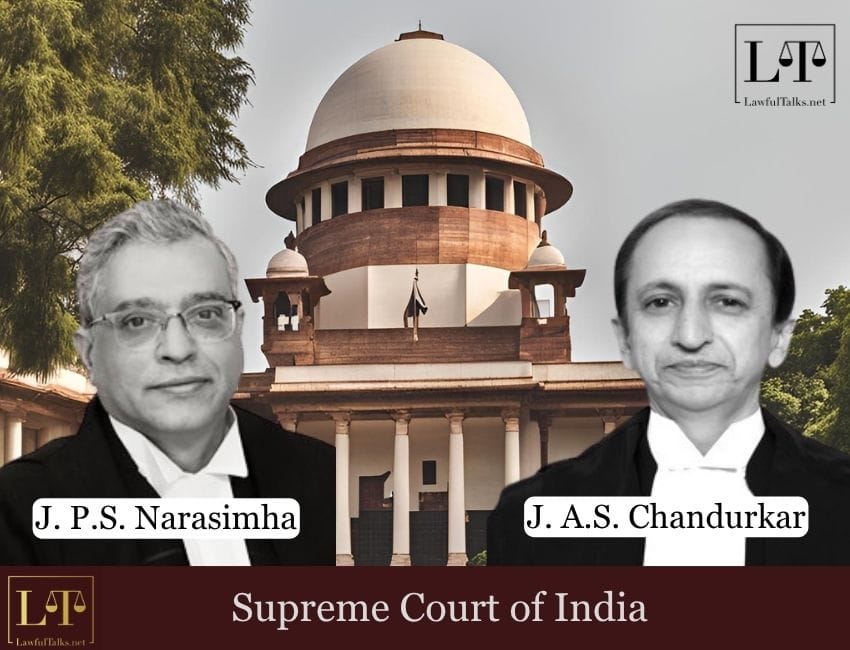Allahabad HC Sets Aside Afzal Ansari's Conviction, Allows Him to Continue as MP

The Supreme Court bench of Justice P.S. Narasimha and Justice A.S. Chandurkar recently ruled that if a judgment is passed in favour of a person who had already died before the hearing, such a judgment has no legal validity and is considered a nullity. The Court further clarified that when an appellant dies before the appeal is heard, and no request is made to substitute the legal heirs, the appeal automatically stands abated.

Background:
The ruling arose from a dispute where the Trial Court had passed a decree in favour of the plaintiff. Dissatisfied with the outcome, two defendants filed a First Appeal challenging the decree. However, both defendants died — one in 2006 and the other in 2010 — before the appellate court took up the appeal for hearing. Despite their deaths and without any substitution of their legal heirs, the First Appellate Court proceeded to hear the matter and delivered its judgment on October 20, 2010, modifying the decree of the Trial Court. The High Court later affirmed this decision.
The legal heir of the deceased defendants subsequently initiated execution of the appellate decree. The plaintiffs objected, contending that the appellate judgment was a nullity since it was rendered in the names of parties who were no longer alive. Their objection, however, was rejected by the executing court, and the High Court also upheld that rejection. Aggrieved by this, the plaintiffs approached the Supreme Court.
Setting aside the High Court's decision, the Bench held that the appellate decree could not stand, since it was passed in favour of deceased individuals.
“the fact remains that prior to the appeal being heard and thereafter decided, both the appellants who had filed the said appeal were no more. The judgment pronounced in the first appeal on 20.10.2010 was, thus, in favour of the parties who were no more alive. The said adjudication, therefore, amounted to a nullity and the same did not have the force of law.” the Court observed.
The Court further clarified that under Order XXII Rule 6 of the Code of Civil Procedure, a judgment remains valid only if a party dies after the hearing has been completed but before the judgment is pronounced. However, this rule does not apply if the party dies before the hearing begins.
“During pendency of that appeal, the defendant No.4 expired on 27.10.2006, while the defendant No.5 expired on 20.09.2010. The record indicates that the appeal was heard on 28.09.2010. As per the provisions of Order XXII Rule 6 of the Code, if a party expires between the conclusion of hearing and pronouncement of the judgment, the same does not result in abatement of such proceedings and the judgment on being pronounced, would have the same force and
effect as if it had been pronounced before the death of such party took place. In view of the fact that the defendant Nos.4 and 5 had died prior to the appeal being heard on 28.09.2010, it is evident that the proceedings in the said appeal are not saved by the provisions of Order XXII Rule 6 of the Code. In effect, the appeal was decided notwithstanding the death of both the appellants, who had preferred the appeal.” the court stated.
Because there was no substitution of legal heirs, the Court held that only the decree of the Trial Court survived and was capable of execution.
“In the case in hand, the judgment in favour of the deceased appellants would be a nullity in the absence of the legal heirs being brought on record and the judgment of the trial Court would be the one that would govern the rights of the parties. Hence, the decree passed by the trial Court would revive for being executed.” the bench stated.
Accordingly, the Supreme Court allowed the appeal, set aside the decisions of the Executing Court and the High Court, and restored the execution proceedings relating to the Trial Court’s decree, holding that only the original decree now governs the rights of the parties.
Case Details: Vikram Bhalchandra Ghongade Vs. The State Of Maharashtra & Ors., C.A. No. 013409 / 2025
Advocate for the Petitioner: Petitioner-in-person
Advocate for the Respondent: Mr. Shrirang B. Varma, Adv. Mr. Siddharth Dharmadhikari, Adv. Mr. Aaditya Aniruddha Pande, AOR Mr. Sanjeev Kaushik, Adv. (Virtual) Mr. Simranjeet Singh Rekhi, Adv. Ms. Jyotika, Adv. Ms. Astha Sharma, AOR

Anushka Bandekar
Advocate
Latest Posts
Categories
- International News 19 Posts
- Supreme Court 390 Posts
- High Courts 383 Posts



















































































































































































































































































































































































































































































































































































































































































































































































































